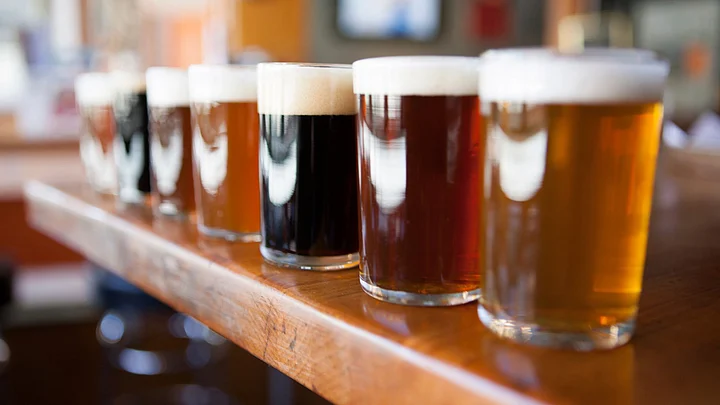Delhi is eagerly waiting for its new Excise Policy to be announced. A committee formed under the leadership of Deputy Chief Minister Manish Sisodia, with ministers Kailash Gehlot and Satyendra Jain, have suggested some sweeping changes and if the same are adopted, the new policy could not only be beneficial for the consumer but also financially more viable for the Delhi Government’s exchequer.
Deputy Chief Minister of Delhi, Manish Sisodia, recently announced many recommendations after inviting opinion of stakeholders of liquor trade as well the common man. These policy recommendations came after a detailed study of all aspects of the trade, and had consent of the Group of Ministers (GoM).
The New Recommendations
- No new liquor licences would be issued in Delhi now
- Approximately all 400 government-owned liquor vends would be closed as there was massive brand pushing of inferior brands from these shops
- Licences of these shops would be given to private players
- Permissible drinking age would be lowered from 25 to 21 years as practised by other states
- Dry days in Delhi would be reduced to 03 from 21. (On 18 additional dry days in Delhi, people from the Capital are forced to buy alcohol from adjoining Noida and Ghaziabad in Uttar Pradesh and Gurgaon and Faridabad in Haryana)
- Delhi will be divided into nine zones to ensure equitable distribution of liquor vends across Delhi as some areas have many vends while others have no liquor shops
- Quality Liquor of international brands will be sold in Delhi
- Regulations of issuing Bar Licences would be relaxed to provide ease of doing business
- Recommendation has also been made to extend the timings of opening of bars and pubs till 3 am
- L1 Licences which are given to distributors and CNF agents, would be given on certain conditions which are 1) The licence holder should have a wholesale distribution experience of five years in any one state of India and 2) And must be having an annual turnover of Rs 250 crore every year for the past three years except year 2020-21, which was affected by Covid-19
Are the Objections Unfounded?
Apart from the Delhi Liquor Traders Association, the BJP and the Congress party are also raising their voice against the new proposed excise policy of Delhi. One has to remember that the policy is being framed by the Delhi government on the lines of what is being already being practiced in Haryana or Uttar Pradesh, where there are BJP governments or in Punjab, where the Congress rules at the moment.
As about the objections raised by the Delhi Liquor Traders Association, they seem to have no ground as their main objection is to issuance of L1 Licences. The Association has said that only two or three players will fit into this category, which is completely devoid of facts. There are more than two dozen players in and around Delhi who fit the five-year experience and Rs 250 crore annual turnover criteria.
The reason behind this opposition of the new policy is amply clear. Cheap brands, manufactured from neighbouring states by the local syndicates, were being pushed across counters to hapless consumers, throughout the day.
Major Bodies Welcome New Policy
The International & Wines Association of India (ISWAI) has in a letter to the Lt. Governor of Delhi, Anil Baijal, has welcomed this policy and said, “We must congratulate the Group of Ministers, and the Government of NCT of Delhi, for their recommendations/decisions towards striving to achieve a cleansing of the Alcobev Trade in Delhi”.
Shopping Centre Association of India (SCAI) has written a letter to Delhi Chief Minister Arvind Kejriwal saying “Many congratulations to the entire team of the Delhi government who has played an instrumental role in putting together such a progressive policy. We are hopeful that it will be implemented and rolled out at the earliest”.
Delhi State to Gain More from Excise Duty
The new excise policy aims to increase the excise duty received by the Delhi Government from existing Rs 5068.7 crore to 7651 crores per annum. This roughly raises the income of the Delhi government, by almost Rs 2500 crore per annum.
The committee has recommended to raise the number of existing 720 liquor vends in Delhi to 916 for its population of about 1.90 crores. In comparison, Mumbai and Bangalore have more vends considering their population.
The National Capital of Delhi, a metropolitan with a population of about 1.90 crores plus a large floating population, is a big liquor market, which has been facing similar problems when it comes to collection of excise duty on sale of alcohol. The porous borders of Delhi, also witness rampant smuggling of duty not paid liquor into the capital, which hurts the state exchequer gravely.
There is not an iota of doubt that the Excise Policy of Delhi of 2009 is indeed quite obsolete and out-dated, and it needs a complete overhaul. It is just the right time when the Delhi government plans to unveil a new and efficient excise policy in 2021.
(Vivek Awasthi is Editor-in-Chief, Indian PSU. This is an opinion piece and the views expressed above are the author’s own. The Quint neither endorses nor is responsible for the same.)
